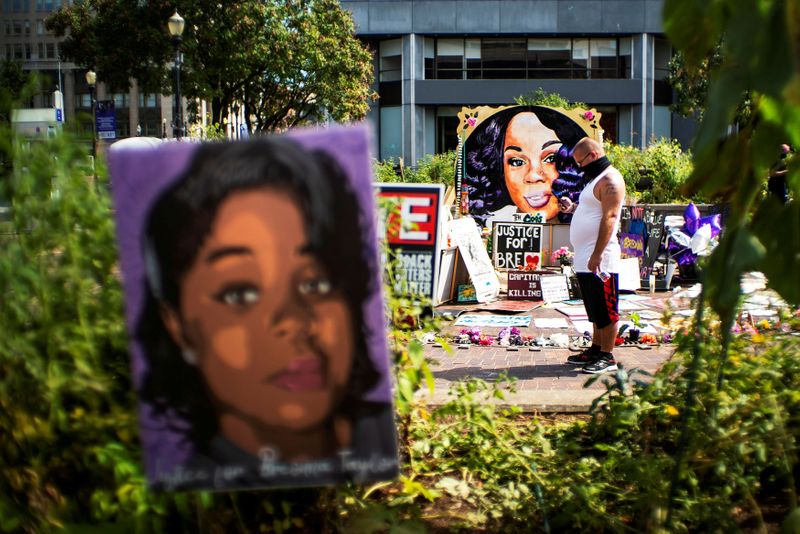 © Reuters. FILE PHOTO: People react after a decision in the criminal case against police officers involved in the death of Breonna Taylor, in Louisville
© Reuters. FILE PHOTO: People react after a decision in the criminal case against police officers involved in the death of Breonna Taylor, in Louisville2/2
By Daniel Trotta
(Reuters) – Kentucky’s attorney general, who presented evidence to a grand jury in the police shooting death of Breonna Taylor, said he did not recommend any charges against the two police officers who shot her as the grand jury needed to make that decision on its own.
The revelation, in a Louisville television interview, pre-empts one of the main points of interest that was going to be unveiled on Wednesday when a recording of the proceedings was due to be made public.
However, Attorney General Daniel Cameron asked the judge for another week to file the recording into the court record, according to a court filing made public on Wednesday, saying the state needed time to redact the names of witnesses and private citizens identified in the recordings.
Cameron told WDRB television in an interview on Tuesday, “They (the grand jury) are an independent body. If they wanted to make an assessment about different charges, they could have done that. But our recommendation was that (Jonathan) Mattingly and (Myles) Cosgrove were justified in their acts and their conduct.”
The case of Breonna Taylor, a 26-year-old Black woman, has revived street protests across the United States against racism and police brutality, further polarizing the country as some voters are already casting early ballots in the Nov. 3 presidential election.
The grand jury last week decided against indicting either Mattingly or Cosgrove, who were placed on administrative leave. Cameron has said the shooting was justified as self-defense since Taylor’s boyfriend, Kenneth Walker, fired first at the officers. Walker has said he believed they were criminal intruders, and an attempted murder charge against him was dropped in May.
The grand jury did, however, indict a third white officer, Brett Hankison, for wanton endangerment for stray bullets that hit a neighboring apartment. Hankison was fired in June.
Critics of Cameron including civil rights attorney Ben Crump, who represents the Taylor family, have been questioning the presentation to the grand jury, suggesting that Cameron, a Black Republican, was protecting the officers. Crump helped the family win a $12 million wrongful death settlement against the city of Louisville.
Cameron previously said he presented the grand jury with “all the evidence” and walked the panel through six possible homicide offenses under Kentucky law.
But prosecutors have wide leeway in how to present evidence to a grand jury, which then decides whether to bring charges.
Cameron told WDRB, a Fox-affiliated channel in Louisville, he only recommended the one charge that was brought.
“Ultimately our judgment is that the charge that we could prove at trial beyond a reasonable doubt was for wanton endangerment against Mr. Hankison,” Cameron said.
The case has put the spotlight on Cameron, a potential rising star in a Republican Party that greatly lags Democrats with the Black vote.
Hollywood celebrities and professional athletes have called for the prosecution of the officers and celebrated Taylor, an emergency medical technician, under the slogan “Say her name!”
Cameron told WDRB he felt free to speak more openly now that a recording of grand jury proceedings would be made public. Cameron previously resisted releasing the grand jury evidence, saying it should remain secret as is normal practice.
A Jefferson County Circuit Court judge had ordered that a recording of the 2-1/2 days of proceedings be filed with the court by noon (1600 GMT) as part of Hankison’s case. But Cameron filed the request for extension on Tuesday, in a filing made public by the court clerk about 90 minutes before the Wednesday deadline.
Hankison’s defense team has agreed to the extension, the filing said, making it highly likely the judge would grant it.
The shooting took place while police were executing a search warrant in a drug investigation involving Taylor’s ex-boyfriend. When the officers burst into her home in the early morning hours of March 13, Taylor’s current boyfriend fired once, wounding one officer. Three officers responded with 32 rounds, six of which hit Taylor.
When the recording is released, particular attention will also be paid to the evidence from one witness who said police knocked on Taylor’s door and announced their presence before breaking in, which other neighbors have disputed, saying they did not hear police give advance warning.
Cameron acknowledged that the witness changed his story.
Neighbor Aaron Sarpee told police in March, “No, nobody identify themself,” the Louisville Courier Journal reported, citing investigative documents. But two months later, in a follow-up interview with investigators, Sarpee said he heard officers knock and announce, “This is the cops.”
“We presented on all of the discrepancies in his testimony,” Cameron told WDRB. “We provided all of that information to the grand jury for them to hear and to process.”



0 Comments:
Post a Comment